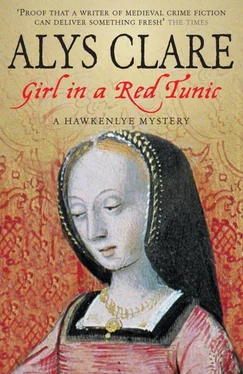Alys Clare - Girl In A Red Tunic
Здесь есть возможность читать онлайн «Alys Clare - Girl In A Red Tunic» весь текст электронной книги совершенно бесплатно (целиком полную версию без сокращений). В некоторых случаях можно слушать аудио, скачать через торрент в формате fb2 и присутствует краткое содержание. Год выпуска: 2006, Издательство: Hachette Littlehampton, Жанр: Исторический детектив, на английском языке. Описание произведения, (предисловие) а так же отзывы посетителей доступны на портале библиотеки ЛибКат.
- Название:Girl In A Red Tunic
- Автор:
- Издательство:Hachette Littlehampton
- Жанр:
- Год:2006
- ISBN:нет данных
- Рейтинг книги:5 / 5. Голосов: 1
-
Избранное:Добавить в избранное
- Отзывы:
-
Ваша оценка:
- 100
- 1
- 2
- 3
- 4
- 5
Girl In A Red Tunic: краткое содержание, описание и аннотация
Предлагаем к чтению аннотацию, описание, краткое содержание или предисловие (зависит от того, что написал сам автор книги «Girl In A Red Tunic»). Если вы не нашли необходимую информацию о книге — напишите в комментариях, мы постараемся отыскать её.
Girl In A Red Tunic — читать онлайн бесплатно полную книгу (весь текст) целиком
Ниже представлен текст книги, разбитый по страницам. Система сохранения места последней прочитанной страницы, позволяет с удобством читать онлайн бесплатно книгу «Girl In A Red Tunic», без необходимости каждый раз заново искать на чём Вы остановились. Поставьте закладку, и сможете в любой момент перейти на страницу, на которой закончили чтение.
Интервал:
Закладка:
‘You have decided it’s a boy?’ Elena raises an eyebrow.
‘I know he is.’
Elena puts her hand on Helewise’s lower belly again, this time leaving it there for a few moments. ‘Aye, aye, happen you’re right.’ Removing her hand, she says, ‘As to coming with you to your husband’s home, I would like that, my girl. But I’ll speak to your mother; see what she has to say.’
Helewise has leapt up, restless energy evident in her very stance. ‘Where are you off to now?’ Elena demands.
Helewise smiles sweetly at her. ‘I’m going to find Father and tell him that I must have my marriage date brought forward because I can’t restrain my excitement and I do so want to be Ivo’s wife before I’m fifteen.’
If anybody suspects the reason for Ivo and Helewise marrying in July rather than August, they never say. As far as Helewise is aware, it is a secret known only to herself, Ivo and Elena. When Leofgar is born the following February, nobody thinks to comment that he is large for a seven-month child; they are all too busy being thankful for a safe birth and welcoming a healthy infant into the world.
In the short time between betrothal and marriage, Helewise gets to know her new family. Benedict is a widower; his late wife Blanche died three years ago from some mysterious swelling in her breast. Helewise tries to encourage Benedict to speak of her; since Helewise is destined never to meet the woman who would have been her mother-in-law, she wants to find out something about her. Benedict speaks of Blanche as if she had been a veritable saint: patient, kind, long-suffering, always considerate of her husband’s well-being and reluctant ever to mutter so much as a word of criticism. Her health was never robust, according to Benedict, and he manages to imply without actually putting it into words that he was a considerate husband and did not insist on his marital rights with any great frequency. Blanche, he tells Helewise with an expression of deep regret, took to her bed at the onset of her illness and stayed there for the year that it took her to die. Meanwhile- But Benedict shuts his mouth firmly and does not speak of meanwhile. It is as if he suddenly remembers to whom he is speaking and, clearly, he wishes his son’s future bride to think well of him.
As an aid to this good impression that he wishes her to form, Benedict presents Helewise with a dazzling array of gifts. He has told Ivo that he will leave the best items in the Old Manor for their use; his small house is quite adequately furnished for a solitary man, he informs his son. Besides this bounty he has ordered new things for the betrothed pair: thick and costly wall hangings to keep out the draughts; a beautiful chest in which to store unseasonable garments and the like; heavy silver candle holders; a new mattress for the marriage bed. For Helewise herself there is a length of brilliant scarlet silk and a gold circlet to wear to secure her veil.
She feels it is disloyal to this most generous of fathers-in-law but still she cannot help herself trying to find out more about him, specifically the things that he is holding back from telling her himself. Ivo can reveal little more than she already knows so she enlists Elena’s help. Elena uses her subtle skills and puts the word out among her many friends and relations that she would be pleased to hear anything they may know of Benedict Warin.
The results are surprising.
Most of her contacts, it is true, perceive Benedict as he paints himself: open-hearted, fond of his meat and drink, a good friend and a cheerful companion; loyal and truthful, a fair master and a generous host. People pity him for the loss of his wife and for the ill health of that wife that prevented her from giving Benedict more than the one child, fine man though this son might be. Benedict likes women; yes, of course, what red-blooded male does not? He flirts with them, praises them, pays them extravagant compliments and makes them feel beautiful and beloved. Yes, indeed. Where is the harm in that?
But some people — quite a few, it seems — know the truth behind this comfortably harmless image. One woman — she is the sister of someone who nursed poor Blanche in her dying weeks — knows very well what Benedict Warin is really like. He uses his easy charm, says she, as a sort of double bluff to conceal his true nature. He is a flatterer and a charmer, but he is more than that: with rather a lot of young women he goes further, seducing them, enjoying them and then abandoning them. While Blanche was alive, or so goes the ugly tale, Benedict always had his excuse ready: my sweetheart, he would say to the girl he was about to discard, how I should love to keep you with me always, care for you as you deserve, make you mine in the eyes of the world as well as in the privacy of our precious moments of intimacy. But what would it do to my poor suffering Blanche if I follow where my aching heart leads me and stay with you? No, no; although it will break me, I must give you up. And, with a tear in his eye and a last tender kiss, off he would go, leaving the poor girl to rearrange herself as best she could, brush the dust from her skirts and pull the hay from her tangled hair.
Since Blanche’s death — a happy release in perhaps more ways than one — his excuse is that he must honour her memory. The fact that honouring a dead woman who is surely past caring means that he dishonours many living ones seems to have escaped his notice.
This is what Elena’s cousin’s friend’s sister reports. Elena tells Helewise, who goes away to think about it. After some time she concludes that, first, it may not be true. Second, is it really any of her business? Third, she likes Benedict and she is hardly going to be affected personally by whatever he gets up to in private. Fourth, she is far too happy and excited to worry about it anyway.
She puts Benedict’s infidelities to the back of her mind and, for a quarter of a century, that is largely where they stay.
Amid the happy splendour of Helewise and Ivo’s wedding day, one small disturbing incident occurs.
The sun has shone since early morning, the bride looks quite exquisitely beautiful and the handsome groom clearly can hardly restrain his impatience to get her alone. Family and friends shower the bridal couple with flowers and the tenants and peasants turn out to wish them well.
The small incident occurs during the splendid feast that Ralf de Swansford throws for his daughter and her new husband in the flower-bedecked hall at Swansford. Helewise, flushed with happiness, is momentarily separated from Ivo as the two make their separate ways around the hall, pausing to talk to their guests, thanking them for the gifts they have brought, encouraging them to eat, drink and enjoy themselves. Helewise is wearing her new scarlet tunic whose silk is so stiff and heavy that it rustles, and Elena has helped her to cut it so that the fullness of the wide skirts begins slightly above the natural waistline; at nearly three months, Helewise’s pregnancy is just beginning to show and this wise precaution has been taken just in case anyone is sufficiently impolite — sufficiently curious — to take a close look at the radiant bride’s belly.
Helewise dances up to an elderly but still handsome couple who are vague relations of Benedict’s and engages them in cheery conversation. They are friendly, affectionate, and they have just given her a beautiful little ivory statue of the Virgin for the private chapel at the Old Manor. Martin, Benedict’s man, comes up to join them.
The four of them, even the taciturn Martin, are laughing, happy. But in the midst of these pleasant exchanges, Helewise suddenly feels as if someone has run icy fingers down her spine. She breaks off in mid-sentence, spinning round, and sees that a malevolent, black-clad and dark-aspected woman of about thirty is glaring at her ferociously, her expression suggesting she would have willingly stuck a knife in Helewise’s back. Helewise catches her breath, shocked to the core by this sudden discordant element in her blissful day.
Читать дальшеИнтервал:
Закладка:
Похожие книги на «Girl In A Red Tunic»
Представляем Вашему вниманию похожие книги на «Girl In A Red Tunic» списком для выбора. Мы отобрали схожую по названию и смыслу литературу в надежде предоставить читателям больше вариантов отыскать новые, интересные, ещё непрочитанные произведения.
Обсуждение, отзывы о книге «Girl In A Red Tunic» и просто собственные мнения читателей. Оставьте ваши комментарии, напишите, что Вы думаете о произведении, его смысле или главных героях. Укажите что конкретно понравилось, а что нет, и почему Вы так считаете.












